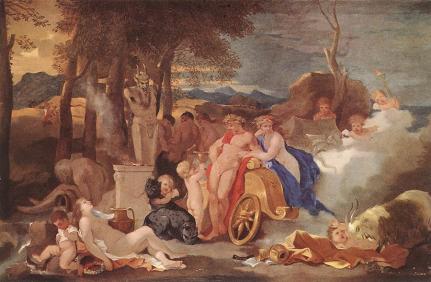
Frater Barrabas recently said that at the core of his magical discipline was assuming the godhead, and he said this in response to Jason Miller’s claim that to him the most important aspect of magick was meditation. Somehow that led to a fight. I believe the two eventually kissed and made up. Apparently the real issue was that Miller was resentful because Barrabas never molested him and took that as a sign that Barrabas didn’t think he was attractive enough or loved him or something, and Barrabas meanwhile didn’t molest Miller because he believes molestation is wrong. Or maybe that was an episode of South Park. I honestly wasn’t really paying attention to the drama and I was watching South Park at the time.
The whole thing got me thinking about what is at the core of magick. I have to say that I don’t agree with either of them. I would agree with Barrabas that a divine connection of any kind is one of the most significant and important aspects of the spiritual path of anyone that has achieved it. But I wouldn’t go so far as to say it should be the core of ones spirituality or is the most important part of magick. It really comes down to the fact that I don’t like the idea of my existence or my spirituality being defined by my divine connection. I like to think that there’s something more than just that. I like things like the idea of achieving divinity, superseding divinity, or even the idea of just wandering the universe to better oneself. In my eyes the gods are there to guide me and help me get where I’m going, to aid and protect, to befriend, I’m even okay if they supposedly have some adversarial role. But I’m not going to elevate them to being the most important aspect of ones spiritual work. To me saying that is like answering the question, “Where are you going on vacation this year?” with “I’m driving to the airport and getting on a plane.” And the whole idea of connecting back into the spark of creation being the height of spiritual evolution seems too much like crawling back into the womb for me.
I disagree with Mr Miller too. Although meditation is an important tool, I don’t think it’s as important as he makes it out to be, and I also think he has a very limited definition of the term meditation and what it can be used for. So the question remains, what is at the core of magical ability?
At first I came up with a short list of essential skills, things that to me, when taken as a group, are both essential to and strengthen almost every other magical ability or skill. What I came up with was meditation, trance, energy manipulation, channeling, and astral projection. But I’d probably also be wrong. After all, both Mr Miller and Frater B. both seem to be competent magicians and both have quite a few years on me (and I say quite because I’ve not yet come to terms with the I am growing older and may soon be old myself), and they came up with completely different answers. Answers which I find very wrong. And you might find these things I listed as being wrong or unnecessary. There’s a good chance you might be right. I guess we could say that it’s different for everybody, but that’s a cop-out that you come up with when you’re not smart enough to figure out the answer.
In truth, I’ve found one core thing that is essential to being successful with your spirituality. I’ve looked at hundreds of practitioners, from New Agers to Neopagans to Ceremonial Magicians to Satanists to Chaos Magicians to Discordians. It doesn’t matter what religion or spiritual beliefs you follow, or exactly what methods you use, it’s always the same thing. It’s present in every magician I’ve seen and its been absent in every person I’ve known that’s never been able to get magick to work. With magicians who are successful early on and then stagnate in their later years, it’s there when they’re young and it goes away when they get older. It’s been absent in every fake, phony, idiot, and mean person I’ve met since I first stepped into the magical community. It’s the thing that has taken me as far as I’ve gotten, is responsible for all of my magical success so far, and will probably end up taking me much further. If you were to research Mr Miller and Frater B. (italicized because it should be the name of a TV show) you’d probably find they have it too.
And it’s not something you’re born with. A lot of people say you need to be born with some innate ability, that you need to be special and elite. They’re liars. If your magick isn’t successful its only because you haven’t quite figured it out yet. I can do magick just fine and I’m a complete fuck up. I’ve regressed past lives thousands of years back, and in every single one I’m also a complete fuck up. And the people who go on about being born with innate magical power and being elite are usually far more fucked up than me. Remember that in every field and in everything else very successful people always have a ‘you can do it too attitude.’ People that tell you that you can’t do something because you’re not good enough or skilled enough or born right are almost always trying to mask their own inferiority.
All you need to be spiritually successful, to be able to perform magick, to astrally project, to connect with the gods, to become a god, to do whatever the hell else it is you want to do is have the proper attitude. That’s all it is. It isn’t just one thing though. It’s a group of different thoughts and beliefs and actions that all come back to proper attitude. So what are some of the things that encompass this proper attitude?
1. Never stop learning, growing, evolving spiritually
Spirituality is all about growing and evolving as a person. It’s not about becoming a master, or an adept, or achieving tenth degree. Titles and degrees are meaningless by themselves, and they’re even more meaningless if you cheated to get them. The important part isn’t being tenth degree, it’s all the crap you had to go through to get to tenth degree. And once you get there you better have new crap to go through or you’re not meeting your full potential.
Some people come into their spiritual path not wanting to grow or learn. It seems crazy, but I’ve seen it happen. You’re supposed to be walking down a spiritual path. But some people choose a spiritual path because they want to have wisdom and magical power, not because they want to cultivate wisdom and magical power within themselves, and that makes a very big difference in terms of what they get out of their spirituality.
A lot of people start out just perfect though. They’re growing and learning and open minded and everything about magick fills them with a sense of wonder and awe. But then they get to a point where they have some success, they get some degrees, and then they stop. They start to consider themselves a master, and other people in the community start to consider them a master too, and so they don’t see a need to push themselves to reach that next level. At the same time it can be very hard for them to start from the very beginning and learn something new. It can be very hard for them to accept anything beyond what they already believe is true, especially that which is contradictory to what they believe is true. It’s very hard for them to listen to someone they believe is their inferior.
For instance, can you see yourself spending twenty years in a system, achieving the highest degree, leading your own group for a long time, and then going to a Wiccan high priestess over ten years your junior who has been involved with the craft all but a year and a day and asking to be initiated in at the first degree? A lot of magicians would believe that due to their power and years of practice and experience they deserve to start out at a higher degree and should have a good deal of respect within the group and a good deal of control over group policy, despite the fact that they haven’t spent one day working with or doing anything for the coven. Some might even feel that they, not the high priestess who founded the group and has been building it and who the members have gathered to learn from, should be running it. And yet if you’ve never studied Wicca, if you’ve never opened a book on it, if you’ve never been a part of a coven, you need to be initiated at the first degree and start from the beginning if you want to get anywhere with it. It’s hard for someone who has worked all these years to attain a position of respect and power to go back to the beginning and start again even once, let alone doing it continuously through out their lives.
And it’s hard for people to remain open minded to things through out their entire life, especially once some of what they believe in has been verified through proof. For example many, many ceremonial magicians believe the power of positive thought is complete bullshit, despite the fact that it is based on the same core theories which hermetics and likewise modern ceremonial magick is based on, and that the suggested application of the theories in practical use are sound. Instead you get, “It’s absurd and pure fantasy to believe that you can make money appear just by wishing for it. How stupid do you have to be to think that will work. What you need to do is banish the evil spirits in the room, draw a magic circle on the ground, wave around your sword and wand, evoke several gods into yourself, summon forth a demon, have anal sex with another man for purely spiritual and not homosexual reasons, and then once again banish any evil spirits that appear. Any intelligent person will tell you that method makes much more sense.”
I have a friend, and he’s far from perfect, he has his faults, but there is one thing that I really do respect about him. He was initiated at three years old, yet through out his entire life he has gone through this same cycle. He gets involved with a system. He starts at the very bottom. He works his way up through the system, and ideally he makes it to the highest possible degree, sometimes group issues prevent him from doing this though. He’s very talented though and he can move through a system fairly quickly. Then he leaves the system, finds a new system, and starts over again. So far he’s mastered Traditional Witchcraft, several forms of Wicca, Catholocism, Luciferianism, Ceremonial Magic, and Louisiana Voodoo among many others I’m sure I don’t even know about. He’s also been involved in several failed systems that didn’t really work, and many different movements. A few years back he was getting involved in Spirtualism and now he wants to study Buhddism.
Despite being a master many times over he still starts at the beginning again and again. He’s also usually open to trying out new rituals and methods, experimenting magically, and listening to the advice of others. He’s constantly adding new things to his ritual and expanding his practical work. This is the way we all should try to be.
And the thing is, master is a relative term. You never actually get to be a true master. From now until forever you will always be going down your spiritual path, you will never be a master of it. You also always want to be pushing yourself to that next level, seeing what will happen if you become even more powerful than what you are today. And there’s always going to be something there for you to learn. If you aren’t becomming stronger, if you aren’t advancing, and if you aren’t learning something new right now, you need to fix that. If you can’t find anything else, join a group or religion you’ve never been a part of until you figure something out.
2. Be fearless in your practice
I’ve brought this up before. Seeing it again and again it’s become one of my pet peeves. If you want to be able to do magick, you have to be willing to do magick. A lot of people who call themselves magicians are not very keen on taking risks, yet that’s the very thing they need to do in order to be a magician.
Don’t just look at spirituality, but look at any field. Making completely calculated and entirely safe decisions, only ever betting on the sure thing, and not taking any action without being confident and secure in the outcome are not qualities we generally associate with successful people. In fact they’re qualities we associate with mediocrity. Why should spirituality be any different, and why should these same behaviors when taken in the context of spirituality make one a part of the so-called elite?
Experience is the key to spiritual evolution and growth. It’s the key to gaining more power. And we learn quickest through trial an error. And we also learn from our failures. I’m not saying things won’t sometimes get really bad. When you screw around with magick things can get really messy. You may die or go insane and lots of other bad things can happen too. But if you want to be a magician you need to be okay with that, you need to come to terms with it, and you need to be okay with the bad things that happen and the bad things that might happen.
If you don’t have this attitude of being unafraid and taking huge risks for huge rewards, you won’t get anywhere with magic. You’ll prepare yourself over and over, and you won’t really get any stronger or safer because you don’t have the experience and practice that you need to become stronger. Eventually you’ll get discouraged and shy away from doing anything too scary or dangerous. If you should happen upon something bad, it will probably just send you into an even deeper spiral, maybe even make you a born again Christian. In any case you’ll probably end up telling people they shouldn’t go messing around with magick at all because it’s just too dangerous. Meanwhile if you would’ve spent just a few months completely unafraid you probably would have gained so much power that the stuff that scares you now would be completely insignificant and meaningless compared to you. And if it took you ten years to get to this point, and you could’ve been that much stronger after only a few months, how strong would you have been after ten years?
Honestly this is a path I’ve seen taken again, and again, and again. And the people on it generally regard themselves as wise and experienced even though they don’t have a bit of practical knowledge. These same people will go around shouting about how experienced magicians are being irresponsible and needlessly endangering themselves, and even more deluded ones will say they’re possibly going to destroy the world or a continent or something. This is so super common we even have a term for these people, armchair magician.
3. Be Curious
In the past I’ve described myself as having a Pandora complex. If I don’t know what’s in the box, consequences be damned, I can’t not open it. If I find a puzzle, I have to figure it out. If I come up with a question, I need an answer. And I will go through anything and risk everything to get that answer. It’s a trait that has served me very well spiritually.
The universe is made up of puzzles and riddles and questions. Solving these things is what spirituality ultimately comes down to. We are looking for answers. Not everybody is looking for answers though. In college I had a professor who was devoted to the ideals of science and Atheistic logic, but he was also a very faithful and devoted Christian. He would come up with explanations about how his biblical and personal understanding of God didn’t negate the scientific factual information he new and believed in. At some point he always hit a wall though, and that’s when he would pull out his ace. He’d say, “A man trying to understand God is like an ant trying to understand man. An ant is a simple and small creature, it has a small brain, and with its limited capacities it can’t even hope to begin to understand as complex as a person.” Of course if you start with the theory that you can’t understand God, of course you’ll never understand God.
It’s the same as answering spiritual questions with, “God works in mysterious ways.” It’s also the same as saying, “I don’t know the answer and I don’t want to try and figure it out, but I still want to seem wise and logical to you.”
Magicians are people who need to get the answer to unanswered questions. They’re not the type who are content if something is left unanswered. At the same time it really doesn’t matter how significant the question is or how much shit you’re going to have to go through to find out the answer. What matters is you have a question you don’t know the answer to, and that needs to be corrected. I have literally walked through hell to answer a question, in fact the question was what does it feel like to literally walk through hell. If you’re wondering, it doesn’t feel at all pleasant.
4. Enjoy yourself, love what you’re doing
This is something I’ve brought up before. You have to enjoy your spirituality. You have to love every aspect of it. People who are the most successful at their careers are the ones who love what they do. And this isn’t even a career. This is more akin to a hobby. You don’t get paid for this. You work somewhere to get paid so you can do this.
After all these years I am still in constant awe and wonder of the things I get to see and do. I read books on spirituality for my own enjoyment. I write this blog for my own enjoyment. I like doing rituals. I like casting spells. I like the way these things make me feel. There really isn’t any aspect of my spirituality I dislike. If you’re not having fun with your spirituality, you’re doing something wrong.
I’m not saying everything is always peachy. I’ve had horrible things happen to me because I practice magick. I’ve gone through my trials like everyone, and its taken me a lot of effort and practice to get where I am with my spiritual practice. But I’m not complaining about it. I don’t regret having done it, and I don’t mind that I’ll have to keep doing it. I don’t need any rewards or degrees for what I’ve gone through either. The fact that I get to practice magick is my reward.
Not too long ago I read an article online about people coming into covens with the wrong attitudes. One of the complaints was that a lot of people join because they think it will be cool or lots of fun to be in a coven, but being part of a coven is a lot of hard work. I would never join a group where the group leader said this. Why should I be a part of a group if it isn’t cool and fun? I go to a job to work and they pay me money. This is my free time. I don’t want to work. I could be sitting at home playing video games. Video games are both cool and fun.
A lot of people go on about how spiritual attainment involves a lot of hard work and sacrifice and they complain about all the stuff they had to do and all the stuff they still have to do. That’s all bullshit. Your spiritual endeavors shouldn’t be work. It shouldn’t be a chore. You shouldn’t feel as if you have to do anything. You should want to do it. You should look forward to every ritual and group meeting and everything else with giddy excitement. And if you don’t want to do it, if it doesn’t make you happy, don’t do it.
If you’re not happy with your spirituality, you’re doing something wrong. Maybe you shouldn’t be a spiritual person, but if you’ve read this far, even skimming, I doubt that. You probably just haven’t found the right spiritual path for you, or you’ve fallen in with a bad crowd. If the people in your spiritual group are miserable and unhappy people, if they make you do things you don’t want to do, if they try to turn your spiritual attainment into school or work or church; fuck them. Go find better people to hang around with, or start your own fun group, or work in solitary for a while. Anything would be better than sticking around in a situation that isn’t fun.
And if you don’t like something, don’t do it. If you can’t stand to read, maybe you shouldn’t be reading books, and you definitely shouldn’t be reading books written by the Golden Dawn boys (they wrote horrifically, far beyond their language skills, and attempted to emulate older scholarly styles, and did so poorly). And there are people that will tell you that you have to read books if you want to gain any kind of insight or attainment. And if you don’t do that, they’ll call you lazy. There’s also people that will tell you that you have to do a lot of other things that maybe you don’t enjoy doing to find spiritual attainment. Fuck them. It’s your spirituality and you can do whatever the hell you goddamn want with it. One of the best parts about being an adept is you get to do whatever you want, and no one can tell you what to do.
And don’t think you have to be all stoic and solemn and serious about something just because it happens to be sacred. You should be having fun and joking around and enjoying yourself and expressing all that joy that’s welled up in you because you’re doing magick. In olden times rituals were places where you would eat at feasts, hang out with your friends, try and pick up dates, dance, sing, drink, and if you were at the right one even get laid.
I’ve never met a competent magician that didn’t have a sense of humor, that wasn’t prone to, at times, make wisecracks or have a fit of the giggles during a ritual. And I’ve never talked with a god that didn’t understand the concept of humor. I’ve never talked with a god that, all other things being equal, didn’t want people to be happy and joyous.
5. Don’t become financially or emotionally dependent upon your spirituality
This is the number that I figure might get me flamed, so I’m going to take time to explain it. If you want to write a book or lead a group because you think you have something important and worthwhile to teach people, that’s a good reason to do those things. If you want to write a book because you think being an occult author is a better life than working a real job, or if you want to start a group because you need to feel empowered, these are bad reasons.
And there’s nothing wrong with making a fair amount of money for you hardwork. There’s nothing wrong with becoming emotionally attached to the people in your group. But problems start occurring when you start becoming dependent on your spirituality to fulfill financial and emotional needs.
It’s even okay if your sole means of income is selling spiritual books or being a psychic or whatever. What’s important is that you have the necessary skills to quit your spiritual job and go back to a regular mundane job and still live the lifestyle you’re accustomed to.
What’s important is that you are not dependent upon a group you’re leading to make you feel powerful or intelligent or special. That you’re able to make friends and find romantic partners outside of your spiritual outlets.
What you should consider is if you became an Atheist tomorrow, you would of course be spiritually empty, but would you continue to have about the same quality of life in every other aspect of your life? Do you have ties to friends you’ve met outside of spiritual groups and functions? Can you make friends outside of spiritual groups and functions? If you’re single or a polygamist or sleeping around, can you find romantic partners outside of spiritual groups and functions. If you don’t have your roles and memberships within certain groups, would you still feel validated and important and feel that you do important things. Are you able to support yourself and your family through non-spiritual means?
You should have answered yes to everything, and if you can’t you have a dependence. You’re dependent upon your spirituality to fulfill a non-spiritual need. When you get to that point, you’re always in danger of compromising your spirituality to meet some other need.
You won’t always do it, and it may not be a big compromise, but when a crisis occurs, it’s really hard not to make that compromise. And once you make a compromise you’re spiritually less than what you were, and it makes the next compromise that much easier.
Consider this. You’re an occult author. You have no other job skill or means of support. This year your books haven’t been selling. You’re on the verge of losing your home and becoming homeless. Your publisher says that he has some really high quality ghost written books on subjects you don’t quite subscribe to, but which are currently in vogue. If you sign over your rights to use your name as an author, he’ll write you a check right now and there’s a good chance you’ll get some royalty money from these books later on. Are you willing to be homeless in this situation?
What if you make your money as a psychic, you don’t have any other job skills, and for years you do just fine with accurate hot readings all the time. Then one day you notice that, for whatever reason, doing those psychic readings are getting harder and harder. When you can’t read for a client do you give them their money back and go hungry, or do you do a cold reading instead?
What if you don’t have any strong family ties and all the close friends you have are in your coven. Your spouse dies. If that coven ceases to provide for you spiritually, are you going to leave that coven? What if you notice the group leader taking sexual advantage of new members. Are you willing to stand up to them and risk getting thrown out of the coven, knowing that you’re in a personal crisis and your entire emotional support network is that coven?
What if you are leading a group and that group is the only thing that seems to give your life meaning and the only worthwhile reason for living. Are you going to make decisions that are in the best interest of serving your group members and yourself spiritually, or are you going to make decisions that are going to secure and preserve the continued existence of the group?
If you’re not putting your spirituality first in these situations, you’re compromising yourself spiritually. And it might not always seem like much, but it makes you less of a magician than you could be, and these kinds of things can really spiral out of control.
The Great Griswald is a famous example. Tim Burton portrayed him as more of a charlatan and showman, but friends who knew him said that he truly believed that he was gifted and could see the future from a young age. Early on he was doing his predictions for fun on the radio as part of an advertisement and he became famous because some were actually accurate. He said once he started making money off of his gift, it started to go away. Was he being punished? No. He probably could’ve got it back. But by that point he was dependent upon it for his income, so he went on to use his reputation to make cold predictions. Eventually his reputation was destroyed, but by then he had a reputation as a showman. He died without ever regaining this wonderful gift, and it’s something that he regretted losing.
And there are lots of stories like that. A lot of psychics and mediums were doing real work early on, but their power started to fade so they started pretending to do the work, because they had no other job skill or way to support themselves. Instead of figuring out what was wrong and working to regain their spirituality, they instead continued down a path of compromise that eventually robbed them of all the spirituality they had, and ruined their reputation while smearing everyone who will ever follow them into their profession.
It’s a sad end, but all you need to avoid that fate is the ability to walk away. If you have a spiritual job, or a spiritual group, or whatever you just need to have the option to walk away from it without it completely changing a non-spiritual part of your life.
6. You are, more or less, whatever you pretend to be.
This is really more of a tip that was given to me than anything else, but it’s one of the great secrets of becoming a master and it falls under attitude. You more or less are whatever you pretend to be.
For example, if you’re new to magick and you enter a group and you have the attitude that you’re just starting to learn about things and you’re sure you’re completely inexperienced and they’re probably so much more knowledgable than you and have mastered so many different things and have such wonderful experiences you can’t even fathom, you’re going to be right about yourself.
If, on the other hand, you go in confident of your magical knowledge and ability, even though you’re new to this, and act the way you think a spiritual master would, answer questions the way you think a spiritual master would, and consider yourself an adept and a guru, you’re probably also going to be right about yourself.
I know it sounds like complete BS, and I didn’t think it would work either, but it does! I stopped acting like I didn’t know what I was talking about and I started acting like I did know what I was talking about. And it turns out I did. Once you start acting like an adept things will start clicking in your head and you’ll gain this deep spiritual insight into a lot of things and people will ask you questions, and you won’t know the answer before, but when they ask them you’ll notice your brain will just figure it out and it will spew out of your mouth. And when you act like an adept and a master you’ll do all of the things that an adept and master would do and think the way they would think, or at least how you imagine they’d do these things, in other words how you’d probably do these things if you were an adept and master. Before long you’ll notice you just made yourself an adept.
Sure maybe someone will call you out. They’ll want you to channel something or be a medium or write an effective spell or something. Just remember that you’re an adept now, and as an adept you’re probably able to do these things. So just do it.
Just try it out as an experiment and see what happens. Start fresh and attend an open meeting for a local group where nobody knows you, or you can even find an active online forum you’ve never been to. Just remember you’re not lying and you’re not cheating, you’re acting. In other words don’t go into an online forum and use that as an excuse to look up answers in books or online. Just say what you think the right answer is.
That’s the secret to being an adept. You just wake up one morning and you decide that you’re an adept. Then you act like one. And that is one of the most well guarded secrets in magick, the way in which a person becomes an adept.
It’s what I did. I just started calling myself an adept one day. It’s the path that lead me here. It’s really all you have to do too.


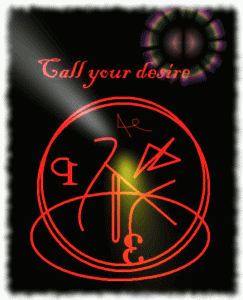
 The binding sigil was one that really struck me because it contained a symbol which I routinely use as part of a binding spell (now that it is given away, I’ll be posting it shortly). I’ve never actually told anyone the methodology of the spell, especially Tom since I use it against him when he tries to get in magical shenanigans when I’m driving him places.
The binding sigil was one that really struck me because it contained a symbol which I routinely use as part of a binding spell (now that it is given away, I’ll be posting it shortly). I’ve never actually told anyone the methodology of the spell, especially Tom since I use it against him when he tries to get in magical shenanigans when I’m driving him places.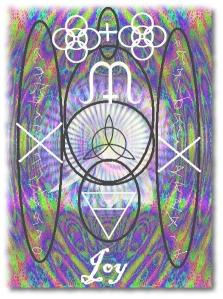 managed to open a lot of stuff up at once and happened upon an entity which called itself Alagon that took an interest in him. Tom began channeling the gospel of Alagon and distributing it to others. He managed to find several other people who knew of Alagon and his work. Alagon meanwhile was causing Tom headaches and some bleeding from his head. Others who worked with Alagon had the same problems, and some apparently died of aneurysm. At the time the true nature of Alagon wasn’t known. Tom was still in contact with Alagon when he moved to Las Vegas, and a local magician, Bon Necron, managed to break Alagon from Tom and partially bind him. Later Tom would give me some of Alagon’s gospel to look over, and reading it I did come into contact with Alagon and suffered a severe headache from it. The true nature of Alagon wouldn’t be known for some time.
managed to open a lot of stuff up at once and happened upon an entity which called itself Alagon that took an interest in him. Tom began channeling the gospel of Alagon and distributing it to others. He managed to find several other people who knew of Alagon and his work. Alagon meanwhile was causing Tom headaches and some bleeding from his head. Others who worked with Alagon had the same problems, and some apparently died of aneurysm. At the time the true nature of Alagon wasn’t known. Tom was still in contact with Alagon when he moved to Las Vegas, and a local magician, Bon Necron, managed to break Alagon from Tom and partially bind him. Later Tom would give me some of Alagon’s gospel to look over, and reading it I did come into contact with Alagon and suffered a severe headache from it. The true nature of Alagon wouldn’t be known for some time.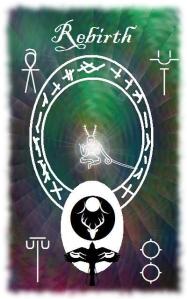 also referred to as the Baron, who was active up until his death somewhere around 1920. He was a very powerful practitioner who had access to quite a bit of information and claims to have known and disliked Allister Crowley. Since his death he’s been in contact with prospective students, although his brutal and violent teaching methods typically lead his students to a gory death if they advance too far into his studies. Some of his knowledge and teachings are openly traded within some circles of the community, and stories of his unfortunate past students are out there. Adiemus had a very strong connection to Persephone and had dealt largely with interdimensional travel, astral projection, and dream walking. Tom had come across some pieces of information on Adiemus throughout his travels.
also referred to as the Baron, who was active up until his death somewhere around 1920. He was a very powerful practitioner who had access to quite a bit of information and claims to have known and disliked Allister Crowley. Since his death he’s been in contact with prospective students, although his brutal and violent teaching methods typically lead his students to a gory death if they advance too far into his studies. Some of his knowledge and teachings are openly traded within some circles of the community, and stories of his unfortunate past students are out there. Adiemus had a very strong connection to Persephone and had dealt largely with interdimensional travel, astral projection, and dream walking. Tom had come across some pieces of information on Adiemus throughout his travels.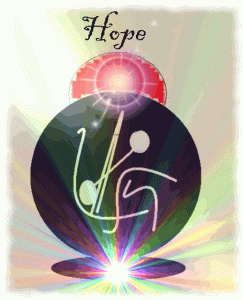 strong connection to Persephone, so that may have something to do with it. Over the years I’ve gained information from Adiemus, and that is where I first learned of the gates and what Alagon, like Adiemus, truly was.
strong connection to Persephone, so that may have something to do with it. Over the years I’ve gained information from Adiemus, and that is where I first learned of the gates and what Alagon, like Adiemus, truly was.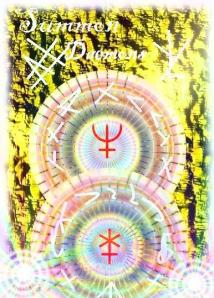 were screwing around with automatic writing when Tom happened upon a magician known has Phillip who had some cool sigils. After talking to him for some time, Phillip claimed to know about several more sigils (the 28 sigils of the ether) and agreed to show them to Tom. Very quickly Tom managed to figure out how to retrieve the sigils without Phillip’s aid. He also happened upon knowledge of other sigils. First the 28 sigils of the Abyss. And then the 28 sigils of Earth, which he reckoned to be the gates that Adiemus and Alagon are connected into.
were screwing around with automatic writing when Tom happened upon a magician known has Phillip who had some cool sigils. After talking to him for some time, Phillip claimed to know about several more sigils (the 28 sigils of the ether) and agreed to show them to Tom. Very quickly Tom managed to figure out how to retrieve the sigils without Phillip’s aid. He also happened upon knowledge of other sigils. First the 28 sigils of the Abyss. And then the 28 sigils of Earth, which he reckoned to be the gates that Adiemus and Alagon are connected into.



